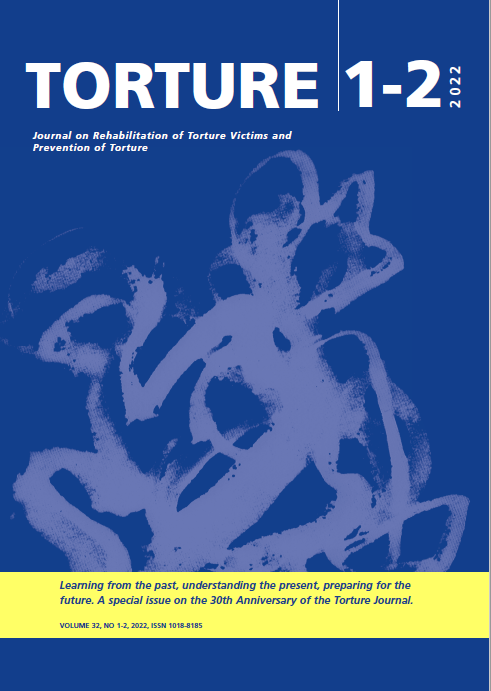Healing the wounds - personal reflections on the evolution of therapeutic methods for survivors of torture
DOI:
https://doi.org/10.7146/torture.v32i1-2.129580Keywords:
Trauma, psychotherapy, transcultural methods, testimonyAbstract
A personal reflection from the past to the present on Inger Agger's work with trauma as a researcher, clinician and international trainer over the last 30 years.
With the arrival in Denmark of torture survivors from Latin America in the nineteen seventies and eighties, therapists faced the challenge of how best to accompany the survivors in their healing processes. The New Left and Feminism were important political movements which influenced the therapeutic approaches discussed at that time. In the author’s meeting with Latin American colleagues, a dialogue about therapeutic methods was further developed with an emphasis on the connection between “Human Rights and Mental Health”. The civil war in the Balkans in the nineties brought new challenges: the development of psychosocial community interventions as well as an intensification of the debate between the “medical” and psychosocial approaches to trauma healing. Cooperation during the last decade with NGOs in e.g., India, Cambodia, and Honduras brought new and more holistic perspectives on therapy represented by a brief version of Testimonial Therapy that sought to integrate cultural and spiritual traditions as well as “third wave” cognitive methods.
References
Agger, I. (2015). Calming the mind: Healing
after mass atrocity in Cambodia. Transcultural
Psychiatry, 52(4), 543-560.
Agger, I., Igreja, V., Kiehle, R., & Polatin, P. (2012).
Testimony ceremonies in Asia: Integrating
spirituality in testimonial therapy for torture
survivors in India, Sri Lanka, Cambodia, and
the Philippines. Transcultural Psychiatry, 46(3-4),
-589.
Agger, I. & Jensen, S.B. (1996). Trauma and healing
under state terrorism. London: Zed Books. Spanish
edition (1996). Trauma y cura en situaciones de
terrorismo de estado – derechos humanos y salud
mental en Chile bajo la dictadura militar. Santiago
de Chile: CESOC.
Agger, I. & Mimica, J. (1996). ECHO psychosocial
assistance to victims of war in Bosnia-Herzegovina
and Croatia: An evaluation. Brussels: ECHO.
Agger, I., Vuk, S., & Mimica, J. (1995). Theory and
practice of psychosocial projects under war conditions
in Bosnia-Herzegovina and Croatia. Brussels:
ECHO.
Agger, I. (1994). The blue room: Trauma and testimony
among refugee women. London: Zed Books.
Spanish edition (1994). La pieza azul: Testimonio
femenino del exilio. Santiago de Chile; Cuarto
Proprio.
Agger, I. (1989). Sexual torture of political prisoners.
Journal of Traumatic Stress, 2 (3), 305-318.
Esala, J.J. & Taing, S. (2017). Testimony therapy
with ritual: A pilot randomised controlled trial.
Journal of Traumatic Stress, 30 (1), 94-98.
Lesley, E. (2021). Lessons for the future: Khmer
Rouge survivor testimonies as sites of individual
and social regeneration. Ethnos: Journal of
Anthropology, 86 (3), 570-591.
Jørgensen, M. M., Modvig, J., Agger, I., Raghuvanshi,
L., Khan, S. S. & Polatin, P. (2015). Testimonial
therapy: Impact on social participation and
emotional wellbeing among Indian survivors of
torture and organized violence. Torture, 25(2),
-33.
Mundt, A.P., Wünsche, P., Heinz, A. & Pross,
C. (2014). Evaluating interventions for
Posttraumatic Stress Disorder in low and middle
income countries: Narrative Exposure Therapy.
Intervention, 12 (2), 250-266.
Pérez-Sales, P. (2021). Personal communication.
Puvimanasinghe, T. S., & Price, I. R. (2016). Healing
through giving testimony: An empirical study
with Sri Lankan torture survivors. Transcultural
Psychiatry, 53(5), 531-550.

Downloads
Published
How to Cite
Issue
Section
License
Copyright (c) 2022 Torture Journal

This work is licensed under a Creative Commons Attribution-NonCommercial-NoDerivatives 4.0 International License.
We accept that some authors (e.g. government employees in some countries) are unable to transfer copyright. The Creative Commons Licence Attribution-NonCommercial-NoDerivatives 4.0 International (CC BY-NC-ND 4.0) covers both the Torture Journal and the IRCT web site. The publisher will not put any limitation on the personal freedom of the author to use material contained in the paper in other works which may be published, provided that acknowledgement is made to the original place of publication.

